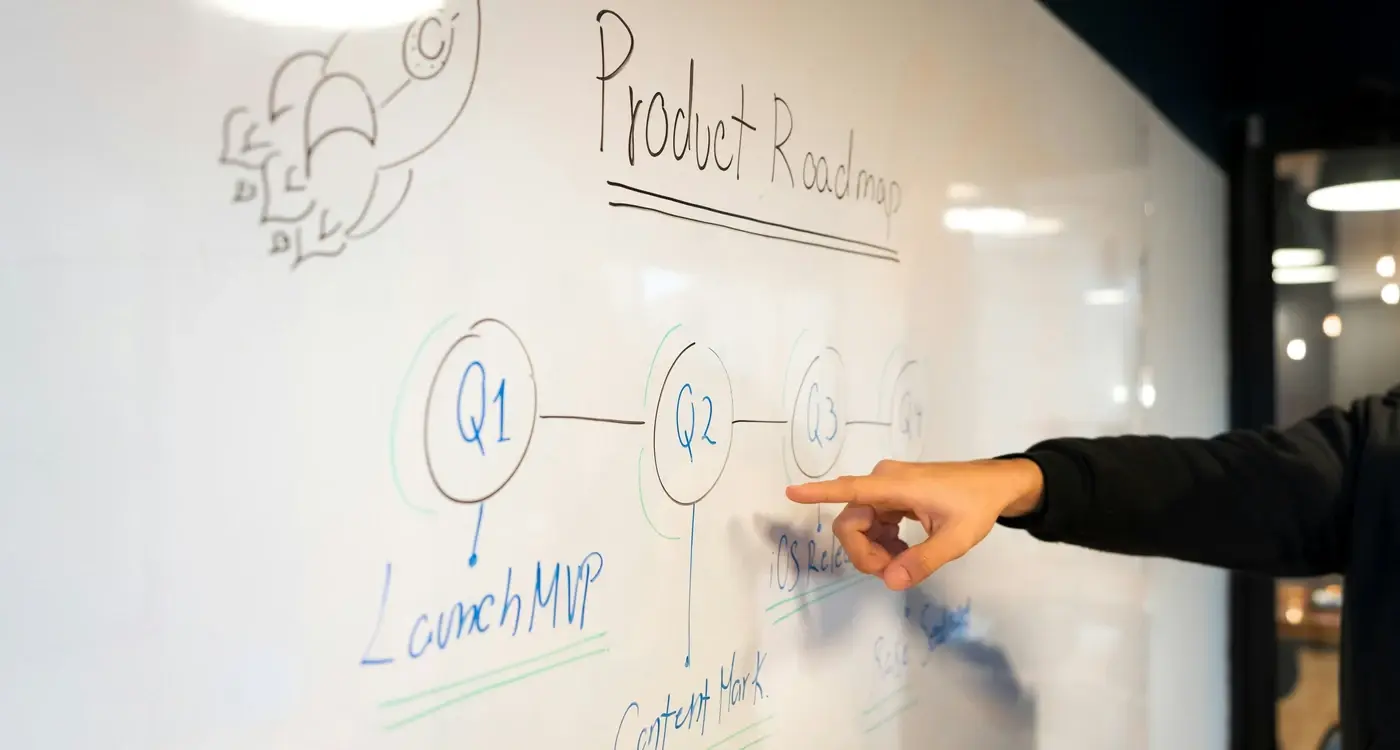App Idea Validation: Separating Gold from Glitter
Every great app starts with that magical "eureka!" moment - a flash of inspiration that makes you think you've struck gold. As app developers who've helped bring hundreds of ideas to life, we know that heart-racing feeling of believing you've got the next big thing. But just like the old saying about all that glitters, not every app idea is destined for success in the bustling British digital marketplace.
The difference between a million-pound app idea and a costly miscalculation often lies not in the creativity of the concept, but in the rigour of its validation
Whether you're a startup founder in Manchester dreaming of the next Deliveroo, or an established business in London looking to digitise your services, evaluating app ideas thoroughly before diving into development isn't just sensible - it's essential. We've seen brilliant concepts fall flat and seemingly simple ideas soar, all hinging on how well they were validated before launch.
Through our experience in app market analysis and concept validation, we've learned that successful app concepts share common threads of thorough research, careful planning, and realistic expectations. Remember the story of Hailo, the British taxi app that seemed unstoppable until it wasn't? Their journey teaches us valuable lessons about app idea feasibility and the importance of understanding your market deeply.
In this guide, we'll walk you through the practical steps of separating truly viable app ideas from those that might need more polish - or perhaps a complete rethink. We'll share battle-tested methods for app idea research that have helped countless entrepreneurs turn their digital dreams into reality, while keeping both feet firmly on the ground.
Why Most App Ideas Need a Reality Check
Picture this: You're lying in bed, and suddenly, you have that 'lightbulb moment' - an app idea that feels absolutely brilliant. We've all been there, and that rush of excitement is incredible. But here's the thing: even the most promising ideas need to be put through their paces before they're ready for the App Store or Google Play.
In our experience working with entrepreneurs across the UK, we've noticed that initial enthusiasm often clouds objective judgment. It's a bit like falling in love - when you're smitten with your app idea, it's hard to see its flaws. Remember Hailo, the British taxi-hailing app? Despite raising millions in funding, they eventually had to exit the UK market because they underestimated the complexity of the London taxi market.
Common App Idea Pitfalls
- Assuming your target audience shares your problem
- Overlooking existing solutions in the market
- Underestimating development costs and timeline
- Focusing on features rather than solving real problems
- Neglecting monetisation strategy
The good news? A reality check doesn't mean crushing dreams - it's about refining them. Think of it like making a proper cuppa: you need the right ingredients, temperature, and brewing time. Rush it, and you'll end up with a disappointing result.
Before diving into development, ask yourself some honest questions. Is your app solving a genuine problem? Would people be willing to pay for it? Are there similar apps already available? These questions might feel uncomfortable, but they're essential stepping stones to success.
Essential Steps to Evaluate Your App Idea
So, you've got an exciting app idea that's keeping you up at night - we completely understand that feeling! But before you dive headfirst into development, let's walk through some crucial steps to evaluate your app idea and ensure it has real potential.
1. Define Your Unique Value Proposition
Start by answering this simple question: What problem does your app solve? Think about how Deliveroo spotted a gap in Britain's takeaway market or how Citymapper made navigating London's complex transport system a breeze. Your app needs to offer something unique or do something better than existing solutions.
Write down your app's core features and benefits, then challenge each one by asking, "Would users actually pay for this?" Remember, not every good idea makes a viable business.
2. Research and Analysis
Conduct thorough app market analysis using tools like App Annie or Google Trends to understand search patterns in your target market. Look at your potential competitors - if you're developing a fitness app, for instance, study how successful British apps like Couch to 5K gained their following.
Consider performing feasibility research through surveys or focus groups. British users have unique preferences and behaviours that might differ from global markets. Understanding these nuances early can save you time and resources later.
Before spending a penny on development, create a simple landing page describing your app idea. Share it in relevant UK Facebook groups or Reddit communities and measure the response. This real-world feedback is invaluable for app idea validation.
Remember, successful app concepts often evolve during the evaluation process. Stay flexible and let the data guide your decisions - sometimes the best ideas come from adapting your original concept based on market feedback.
Market Research: Understanding Your British Audience
When it comes to understanding the British market, there's quite a bit more to consider than just tea preferences and weather chat! The UK app marketplace has its own unique characteristics that can make or break your app's success.
Know Your British Users
British users tend to be tech-savvy but notably privacy-conscious, much like their European neighbours. Did you know that the average Brit checks their phone 58 times a day? Yet, they're also quite selective about which apps earn a permanent spot on their devices.
Start your research by examining successful British apps like Deliveroo or Citymapper. These apps didn't just stumble into success – they solved specific problems for UK users while understanding local nuances. For instance, Citymapper initially focused on London's complex transport system before expanding globally.
Practical Research Methods
Begin with surveys and focus groups across different UK regions – what works in London might not resonate in Manchester or Edinburgh. Use tools like YouGov or British Market Research Bureau (BMRB) for demographic insights. Don't forget to check App Store analytics specifically for the UK market.
One often-overlooked approach is to visit local tech meetups and startup events. The British tech community is remarkably welcoming, and you'll find honest feedback about your app idea. We've seen countless entrepreneurs pivot their concepts after a single evening of chatting with potential users at Silicon Roundabout.
Remember, successful validation isn't about proving your idea right – it's about understanding whether it truly solves a problem for British users. Sometimes, the most valuable outcome is learning that your idea needs refinement before investing significant resources in development.
Testing Your Concept: From Paper to Prototype
Once you've done your initial app idea research, it's time to bring your concept to life - but don't rush straight to development just yet! Starting with simple sketches might feel underwhelming when you're bursting with excitement about your app idea, but it's a crucial step in the validation process.
The difference between a £1,000 mistake and a £100,000 mistake often comes down to how early you test your assumptions.
From Sketch to Interactive Prototype
Begin with basic pencil sketches of your app's key screens. We've seen countless entrepreneurs save precious time and resources by identifying usability issues at this early stage. Remember how Deliveroo started with simple paper mockups before becoming a British success story? Your sketches help visualise the app idea feasibility before investing in detailed designs.
Getting Real-World Feedback
Once you've refined your sketches, create a clickable prototype using tools like Figma or Adobe XD. This allows potential users to interact with your concept, providing invaluable insights for your app market analysis. We recommend testing with at least 5-10 people from your target audience - preferably in person, as us Brits tend to be more honest face-to-face than in online surveys.
Don't be discouraged if your first prototype highlights problems - that's exactly what it's meant to do! Consider how Just Eat evolved their concept through multiple iterations before landing on a successful app format. The key to developing successful app concepts is remaining flexible and letting real user feedback guide your decisions, rather than clinging to your initial vision.
Conclusion
Validating your app idea might feel like putting your dreams through a rigorous examination, but it's a crucial step that separates successful apps from those that fade into obscurity. Think of it as giving your idea the best possible chance to thrive in the competitive British app marketplace.
Remember, some of Britain's most successful apps, like Deliveroo and Citymapper, didn't just spring from brilliant ideas - they emerged from thorough validation processes that confirmed real market needs. Their founders took the time to understand their audience, test their assumptions, and refine their concepts before diving into full development.
As you move forward with your app idea, keep in mind that validation isn't about crushing dreams - it's about shaping them into viable realities. Whether your research reveals a clear path forward or suggests a pivot might be necessary, each insight you gain is invaluable. Sometimes, the most successful apps emerge from ideas that evolved significantly during the validation process.
Take your time with each step we've discussed: assess your idea objectively, research your market thoroughly, and test your concept carefully. And remember, you don't have to navigate this journey alone. Many successful British app entrepreneurs started exactly where you are now, armed with an idea and the wisdom to validate it properly.
The difference between a glittering idea and one that's truly golden often lies in the willingness to put it through its paces. By following a structured validation process, you're not just testing an idea - you're laying the groundwork for something that could genuinely make a difference in people's lives.
Share this
Subscribe To Our Blog
You May Also Like
These Related Stories

App Idea Validation: The Lean Process for Testing Market Demand

From Idea to Income: Realistic Paths to App Concept Monetisation





